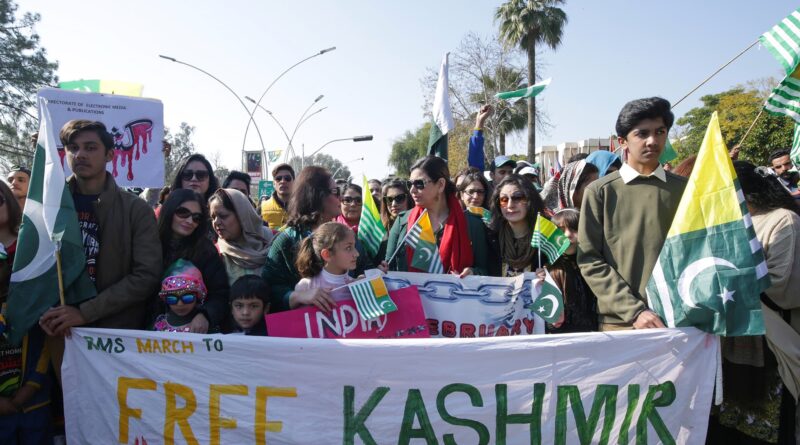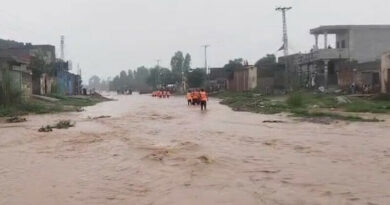Kashmir Accession Day marked by public rallies, demos and cultural events
Staff Report
ISLAMABAD: Kashmiris on both sides of the Line of Control and the world over observed the Accession to Pakistan Day on Saturday with a renewed pledge to continue the plebiscite struggle for Jammu and Kashmir and its complete merger with Pakistan.
It was on 19th July 1947 that genuine representatives of the Kashmiris unanimously passed resolution of Kashmir’s Accession to Pakistan during a meeting of the All Jammu and Kashmir Muslim Conference at the residence of Sardar Muhammad Ibrahim Khan in Abi Guzar area of Srinagar.
The historic resolution called for the accession of Jammu and Kashmir to Pakistan in view of its existing sentiments, religious, geographical, cultural and economic proximity to Pakistan and aspirations of millions of the Jammu and Kashmir people.
Kashmir Accession Day was marked by public rallies, demonstrations and cultural events across the country. Leaders from across the political spectrum reiterate Pakistan’s support for the Kashmiri right to self-determination.
In KP, the streets and roads were decorated with Pakistani and Kashmiri flags, with public figures addressing large gatherings. In schools, students performed skits and sang patriotic songs. The media played archival footage, while op-eds revisited the unfulfilled promise of the 1947 Kashmir Accession Resolution.
“On July 19, 1947, a month before the partition of British India, political leaders in the Muslim-majority region of Jammu and Kashmir gathered in Srinagar. The All Jammu and Kashmir Muslim Conference had passed a historic resolution favoring Kashmir’s accession to Pakistan,” said Professor Dr Ejaz Khan, former Chairman International Relations Department at University of Peshawar.
He said the landmark resolution came amid India’s hegemonic designs, rising communal tensions, and debates over the future of princely states.
“Pakistan was seen by many Kashmiri Muslims as a natural home, due to cultural, religious, and geographic ties. However, history took a different turn and in October 1947, India had illegally landed its troops in Srinagar, sowing the seeds of one of the world’s most intractable disputes and starting of first Indo-Pak war on Kashmir.
Since then, India had broken all records of human rights abuses, extra judicial killings and state terrorism in IIOJ&K where life became a nightmare for oppressed Kashmiris.
Mushtaq Ahmed Shah, Vice Chairman, Jummu and Kashmir Peoples League said that July 19 was a historic day on this day Kashmiris passed a landmark resolution announcing to join Pakistan.
Professor Dr AH Hilali, former Chairman Political Science Department, University of Peshawar said that the Kashmir Accession Day is powerful reminder of the Kashmiri people’s aspirations and their rightful demand to be part of Pakistan.
He said that strategic stability has been threatened by India as it continues to receive abundant supply of conventional and non conventional weapons that put the peace of South Asia at stake.
Hussain Khateeb, member All Parties Hurriyat Conference (Gillani Group) said the burning of mosques, houses and shops belonging to Muslims at BJP-led Tripura state by Hindutvta groups of RSS, VHP and Bajrang Dal has exposed Modi’s tyranny against minorities.
Former ambassador Manzoorul Haq said that the illegal occupation of Kashmir valley by India had negated multiple articles of the 30 fundamental human rights of the Universal Declaration of Human Rights (UDHR) drafted by representatives from all the regions of the world including India on December 10, 1948 that subsequently adopted by the United Nations General Assembly (UNGA).
“This declaration was applied to all the signatory members of the UN including India and restrained them from all kinds of abuses, exploitation, maltreatment and violence besides violation of any fundamental rights protected in UDHR”
Ambassador Manzoor said India’s October 27, 1947 and August 5, 2019 illegal acts was a complete violation of international human rights laws including 4th Geneva Convention and UN Security Resolutions.



